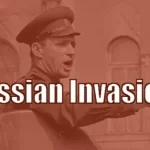| Frequency (MHz) | Signal Mode | Callsign | Note |
| 2.737 | CW / Digital | REA4 | Air Force HQ Moscow |
| 3.633 | CW | CEJX | |
| 4.179 | CW / Digital | REA4 | Air Force HQ Moscow |
| 4.672 | USB | Vologda Radio | Sometimes call checks Il-76 |
| 4.755 | USB | Blesk 37 Ja Skat 07 | Possible Air Force use |
| 5.312 | CW | Russian Strategic Air Force TU-95 ground CW frequency | |
| 5.620 | CW | Russian Strategic Air Force CW Ground Frequency | |
| 5.832 | CW | RICARJ | 72131, 72132-TU-22 from Renchovo |
| 5.835 | CW | Russian Strategic Air Force TU-95 CW ground frequency | |
| 6.685 | USB | PROSELOK KORSAR KLARNETIST |
Traffic control comms air force Chkalvosky Moscow Region |
| 7.940 | CW | REA4 | Air Force HQ Moscow |
| 8.029 | CW | Russian Strategic Air Force Bombers TU-95 CW Ground Spring Primary Frequency | |
| 8.090 | USB | NABOR
SHAPORA |
Russian Strategic Air Force Bombers TU-95 Spring Frequency |
| 8.033 | USB | Russian Strategic Air Force Bombers TU-95 Autumn Frequency | |
| 8.112 | CW | BALANS KATOLIK | Russian Strategic Air Force TU-95 CW Winter ground frequency |
| 8.131 | USB | BALANS KATOLIK | Russian Strategic Air Force Bombers TU-95 Winter Frequency |
| 8.162 | CW | Russian Strategic Air Force Bombers T-95 Ground Autumn Primary Frequency | |
| 8.170 | CW | 6PLS D2WD | Russian Strategic Air Force Bombers TU-95 Spring Air CW Frequency |
| 8.816 | CW | Naval Air Transport | |
| 8.847 | USB | Traffic control comms air force Chkalvosky Moscow Region |
|
| 8.895 | CW | Russian Strategic Air Force TU-95 Summer CW Ground Frequency | |
| 8.909 | USB | OCHISTKA, PROCELKA | Russian Strategic Air Force Summer TU-95 Frequency |
| 8.252 | USB | Russian Air Force Unknown Unit | |
| 9.027 | CW | Russian Strategic Air Force TU-95 Bombers Autumn CW Air Frequency | |
| 9.128 | CW | P7YR W6SY QYYI | Russian Strategic Air Force TU-95 Bombers Summer Air CW Frequency |
| 11.072 | CW | REA4 | Air Force HQ Moscow |
| 11.354 | USB | RJF94 / NOVATOR PRIBOJ KROCKET |
Russian Naval Air Transport Command |
| 11.360 | USB | PROSELOK KORSAR |
Traffic control comms air force Chkalvosky airfield Moscow Region |
| 18.030 | USB | KORSAR | Traffic control comms air force Chkalvosky Moscow Region |
Known Russian Strategic Bomber VHF frequencies: 124.000 128.500 136.250 138.550 284.650 289.000 358.125
Notes on TU-95 and TU-160 Strategic bombers communications
If the TU-95 CW markers are active, its an indication that bombers are in the air and its possible to monitor USB frequencies. Every 20 minutes lasting for 2 minutes a single letter will be repeated by CW. Its always on the H+00, H+20, H+40 and normally handset. Marker W is commonly heard probably from Moscow Strategic and Long Range aviation headquarters.
The G marker possibly comes from Russian Ukrainka Air Base in Amur District in Far East Russia. Other undefined markers are Q, R and Z. C marker is used by TU-95 bombers used by Russian Navy from Moscow Naval HQ. Arkhangelsk Severomorsk naval base use S marker.
The bomber formations use callsigns. Known callsigns are TRL5 – Spring TV6P, IZ2J and KFE4 – Summer 4ASU, QZ6Y and PUO7 – Autumn IWV4 – Winter. Three figure groups are used in messages, although it’s speculated that five-figure groups are actually used.
The ground communications to aircraft using USB voice use callsigns such as NABOR, BALANS and KATOLIK that are fixed and are not affected by the seasonal changes.
Usual message format callsign, then the air unit number and coded numbers group that holds itself navigational directions.
KATOLIK for 48123: (unit number) / 694 062 405 274 527 /
During the flight, these navigational readings are sent frequently, because of bad readability the radio operator must repeat the message groups frequently. The female operator heard often is operator from the ground stations.
However, it’s been observed that also Monolith type messages similar to those used by ground forces are used. In this case, the format and reading conduct are similar to command message send on S30 the Pip.
1 ЩРФ 56555 ПЛЮМАЖНЫЙ 2961 9651ВВ 09147 УШИБОХАЛЛ 6029 8105
1 ЩРФ 86312 УШИБОХАЛЛ 6029 81051 ЩРФ 56404 КРИЗОЛЮК 3525 2278
1 ЩРФ 80013 СЧЕТОКУБ 9492 4148 ЧАЕВОД 0264 2102 МЫШЕЧНЫЙ 1909 0741
January 16 2017 recording and transcripts – Запись кодировок на частоте 8131 (17.01.2018)
Sources
1.) http://milavia.blogspot.com/
2.) https://sites.google.com/site/russianradiodx/the-frequencies-of-the-air-force
3.) http://johngaltfla.com/wordpress/2014/03/01/russian-and-ukrainian-shortwave-civilian-and-military-frequencies-to-monitor-during-conflict/
4.) http://mt-milcom.blogspot.com/2014/11/russian-tu-95ms-bear-net-heard-on-new.html
5.) https://planesandstuff.wordpress.com/2015/01/31/bear-hunting/
6.) Roper,Tony. Bear Hunting: Tracking Russian Air Force Flights via CW and SSB. Spectrum Monitor. 2014. October Nr.10
7.) Roper.Tony Monitoring Russian HF Military Networks. Spectrum Monitor. 2016. June Nr,6




